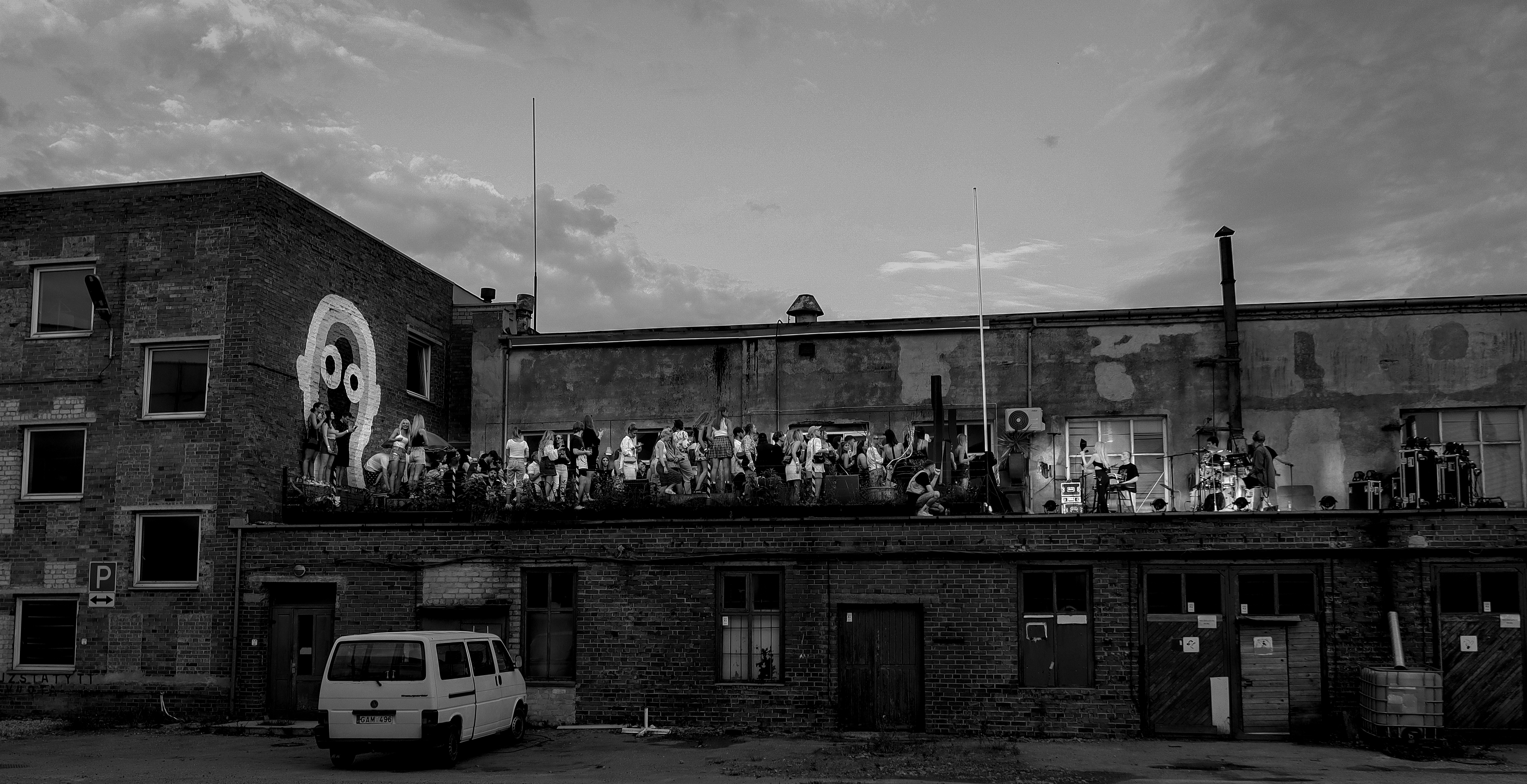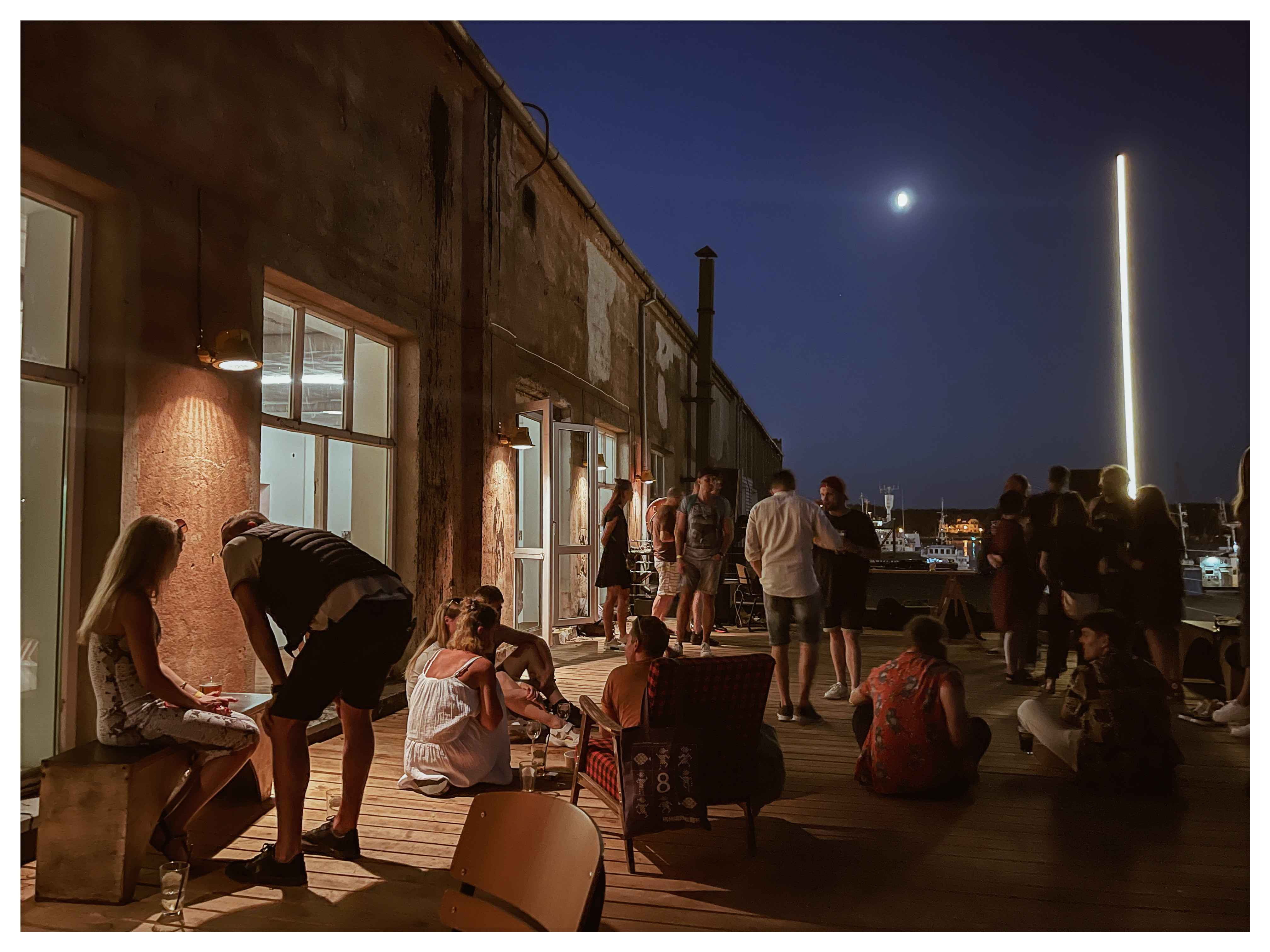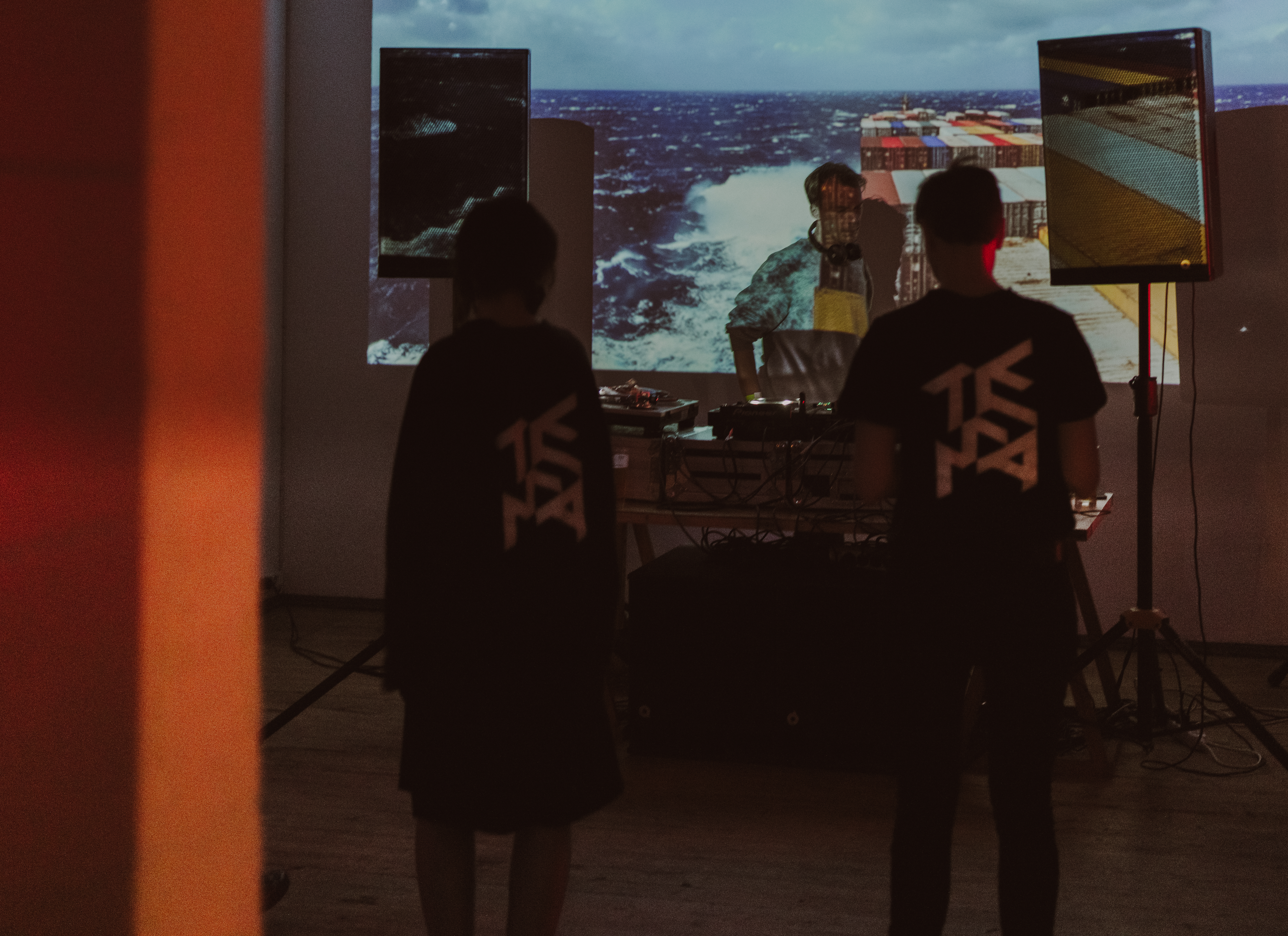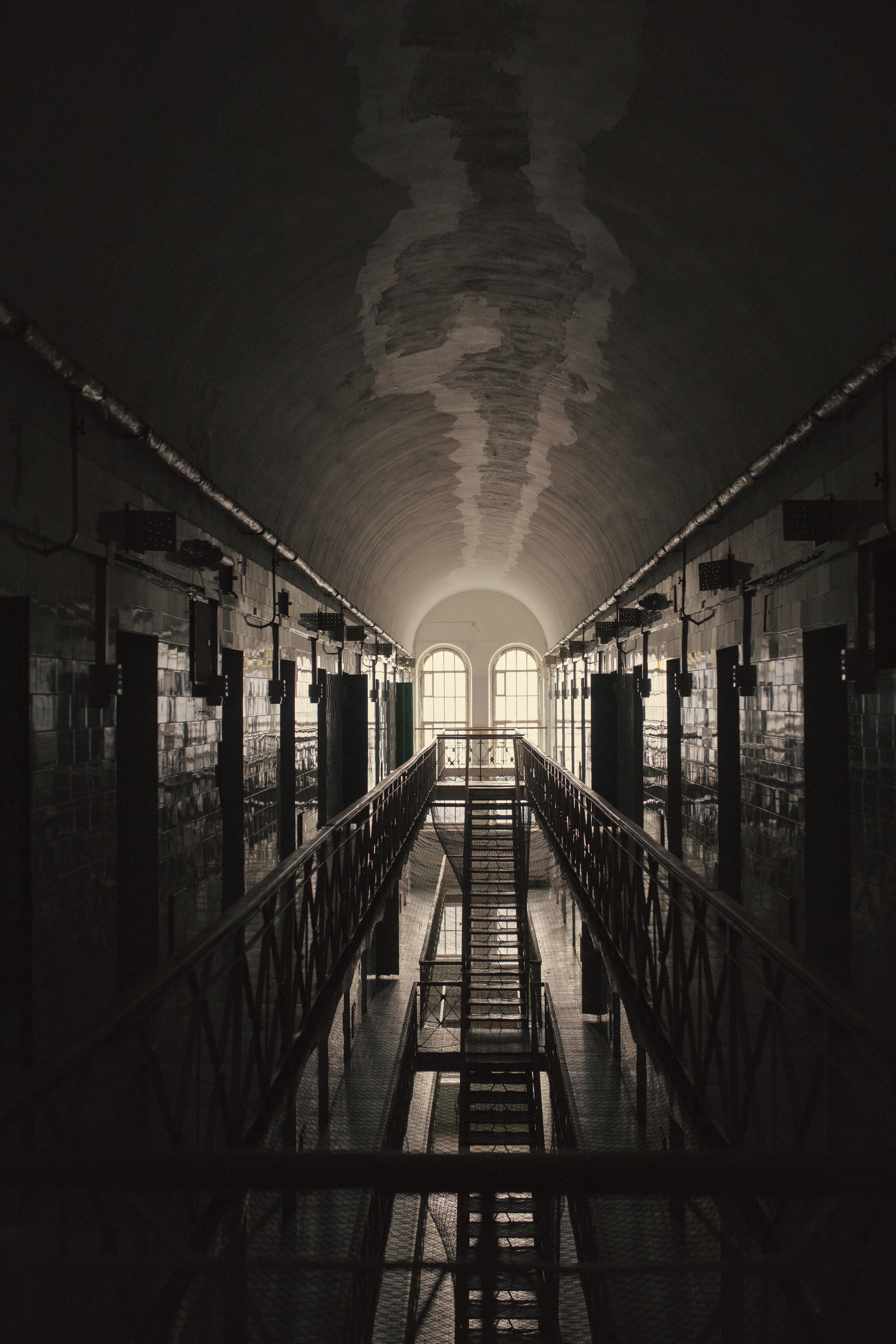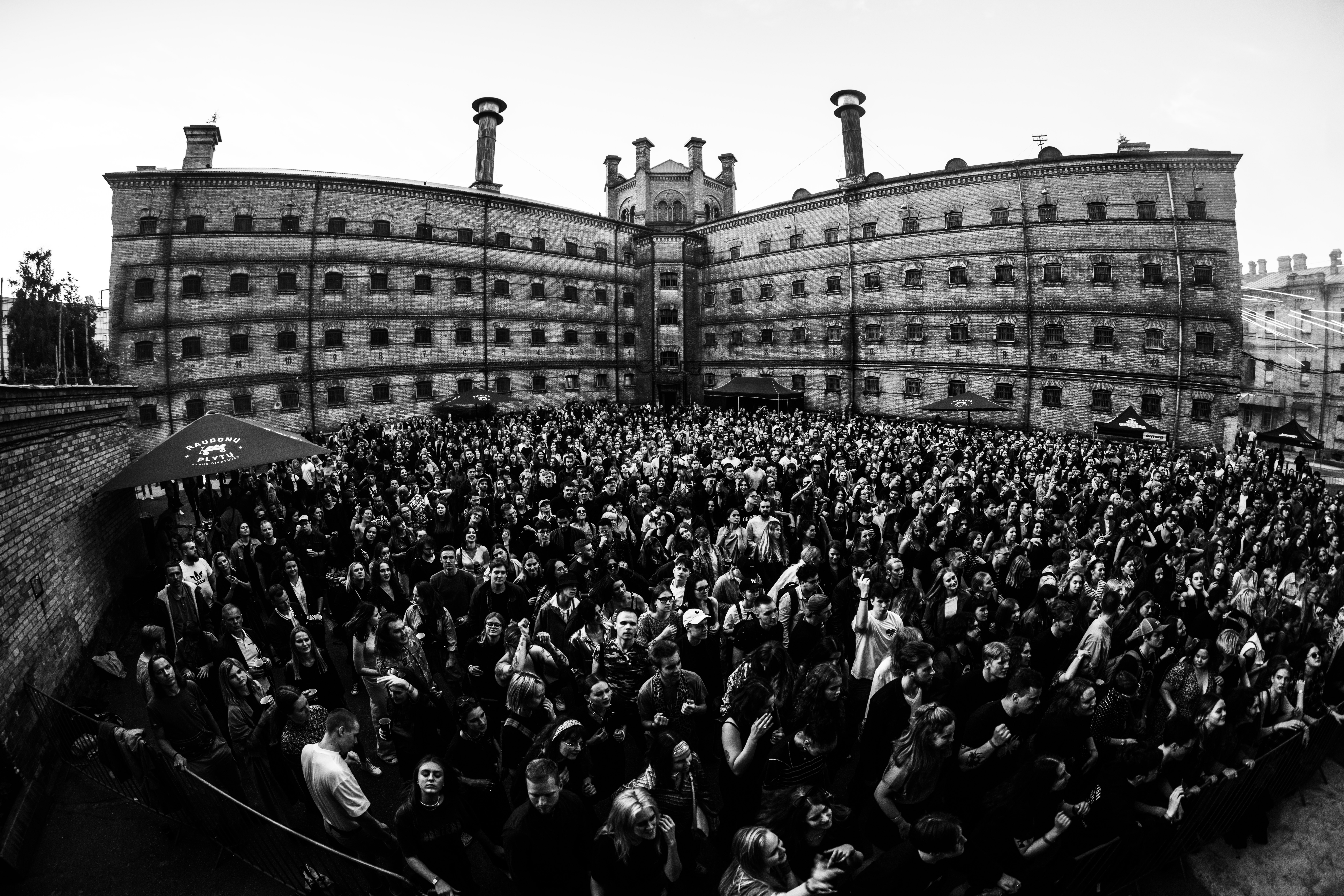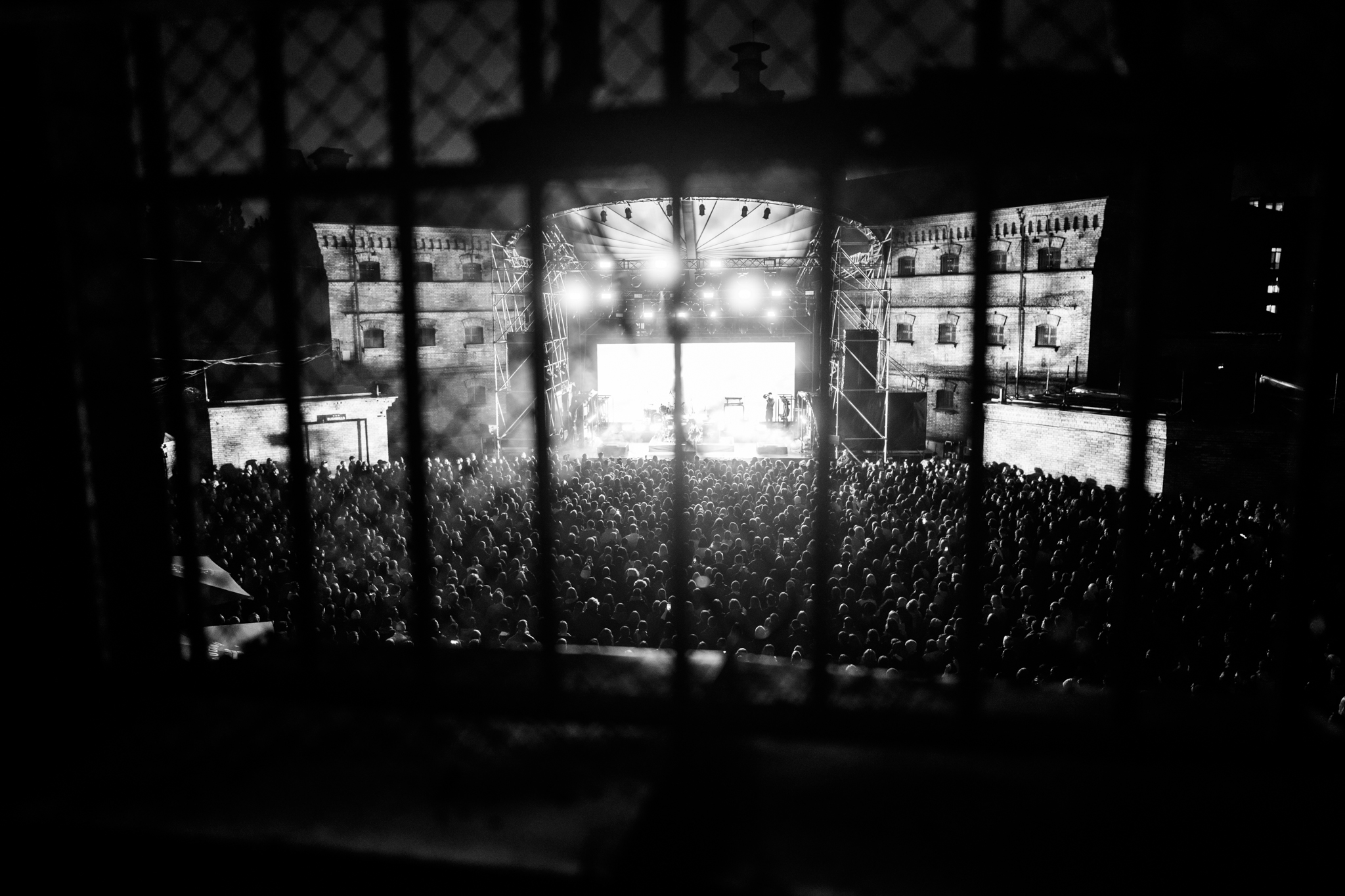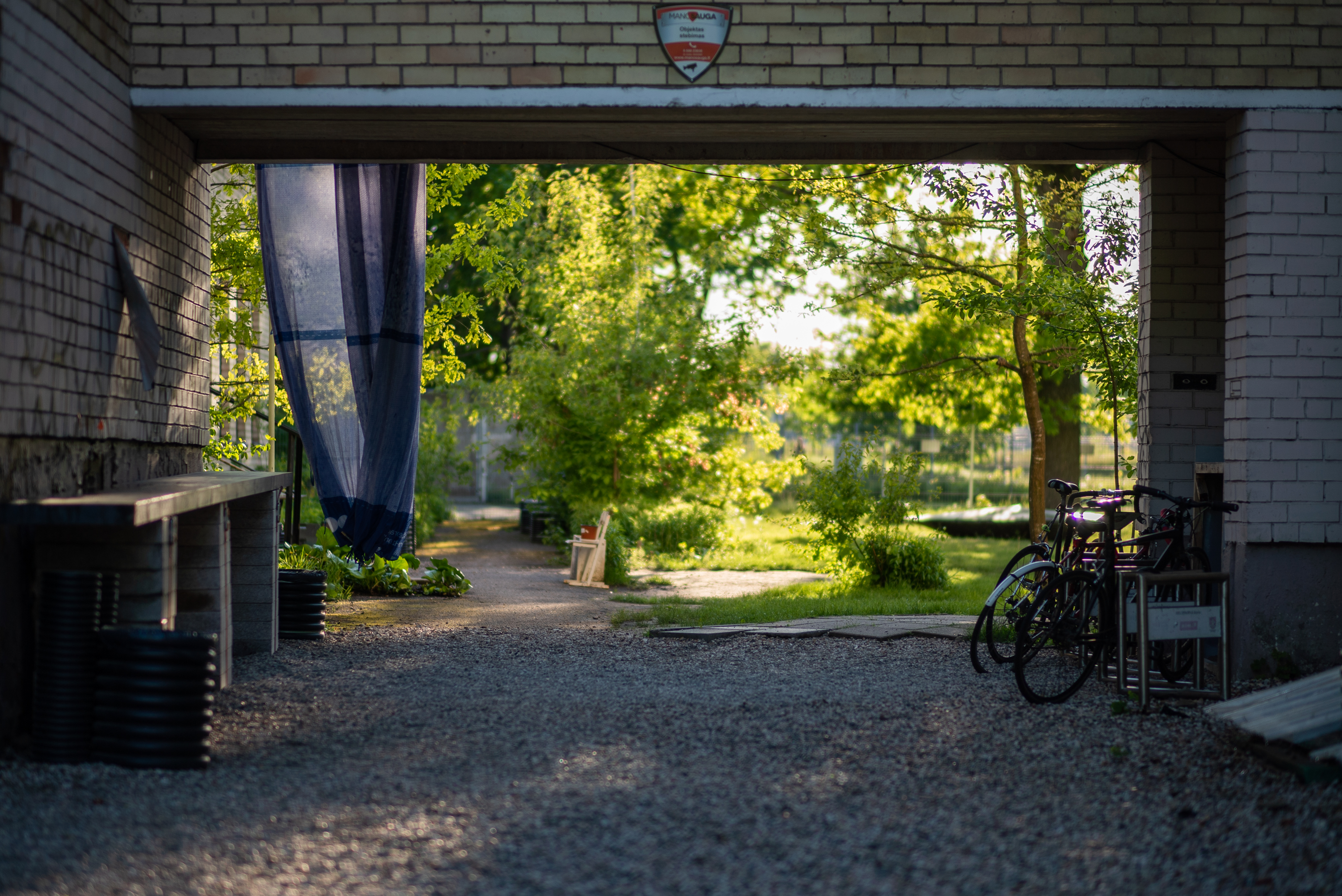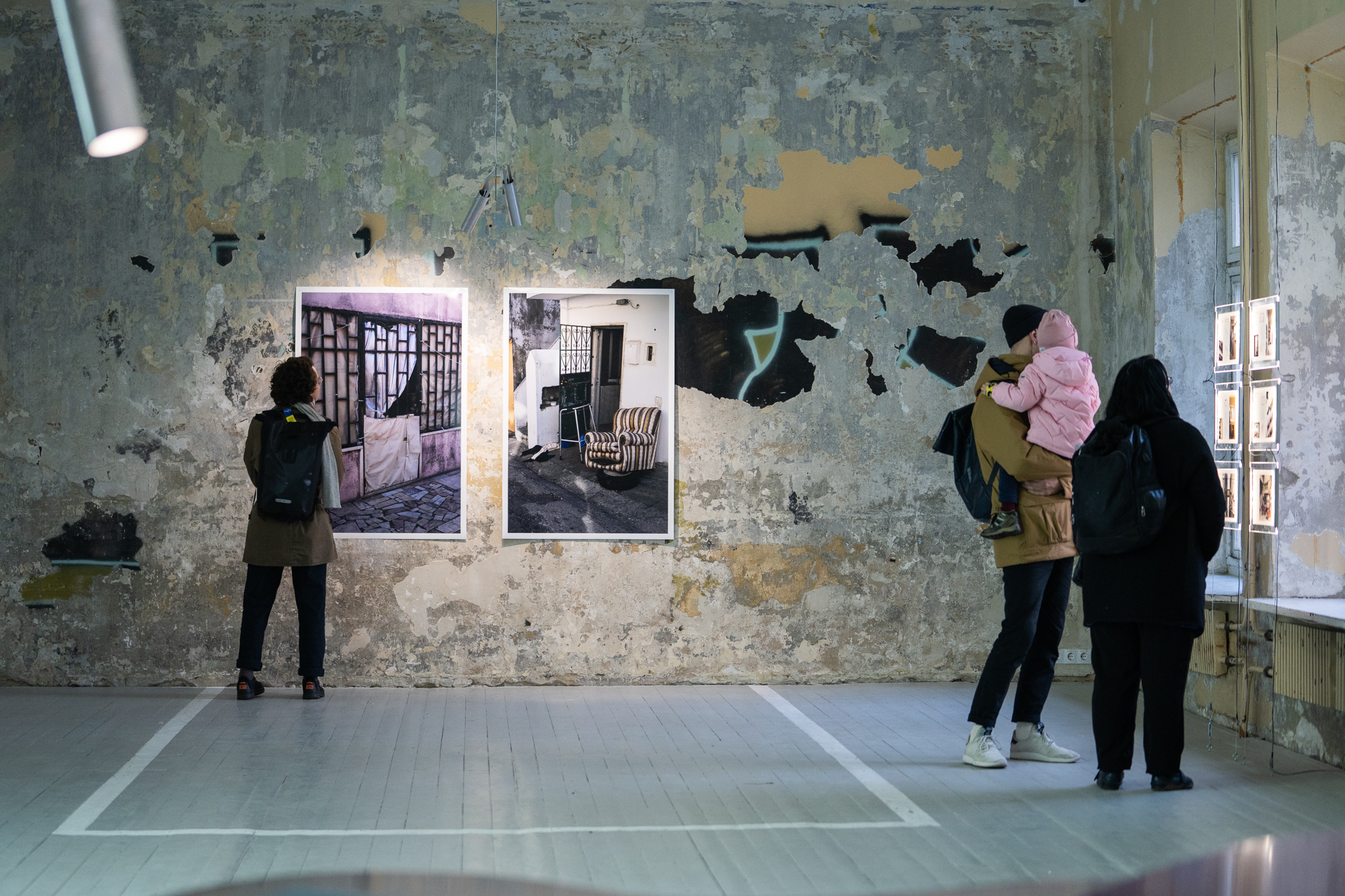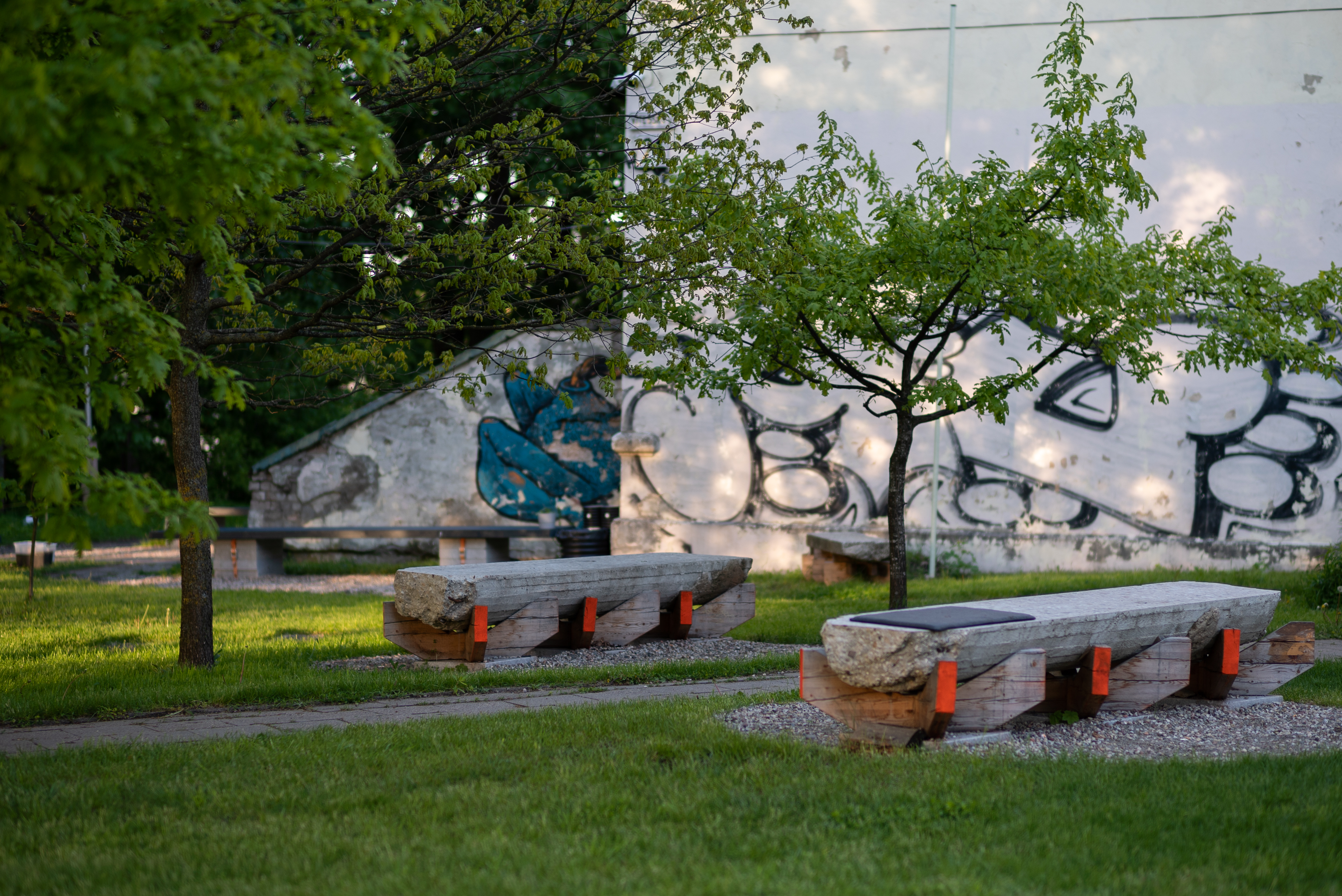Laura KEŠYTĖ | T.E.M.A. + Lukiškės Prison 2.0 + Sodas 2123
“Galleries are colonizing old industrial spaces all over the world. The same phenomenon is happening with decommissioned prisons – they’re becoming cultural venues, youth clubs and hotels. Either way, the buildings’ architecture and memory affect the audience by adding an unexpected layer to the displayed art itself,” says art critic Agnė Narušytė.
Soulful shipyard
I’m sittin’ on the dock of the bayWatchin’ the tide roll away, ooh
I’m just sittin’ on the dock of the bay
Wastin’ time Otis Redding, (Sittin’ On) The Dock Of The Bay
In Klaipėda, an old maritime city in Lithuania, there is this beautiful community called T.E.M.A.[1] Artists, craftspeople, ecology lovers and cultural devotees of all sorts and kinds can find a place here.
To be exact, here is more of a feeling than a place. The community doesn’t own any land, a venue, a residency or an art space but occupies one. Always temporarily.
“As an organisation, we’ve been around for twelve years. We used to operate in another abandoned factory known as Fanierkė just before we moved to the old shipyard complex Memel City,” says the well-known light artist Linas Kutavičius, the founder of T.E.M.A. The shipyard complex is ‘a good ghost’ from the distant industrial revolution era, but it has already ensured a future – a bright and rather posh one.
“With the new luxurious residential buildings, contemporary office spaces, cafes and bars that will be built here soon, its ambition is to become the second-most famous area in the city after the Old Town,” the artist foretells. But for the moment, Memel City is still open in its authentic uniform. The full industrial jacket is on, and it has a soulful heart.
Democratic, friendly and free
Entering the venue through the five-metre-high gate, you encounter an old rustic ship. And it’s not there just for show. Earlier, it served as a greenhouse and before that as a playground for kids, says Linas.
For most of its life, the old shipyard complex was unavailable for snoopy tourism. “It was a dreadful and dirty area, full of grimy dipsos who used to work there during the soviet times,” recalls local artist and photographer Remigijus Treigys. “But now it feels like Berlin.”
For the last couple of years, Memel City has been a residency where concerts, art exhibitions, cultural events, parties and good things happen. You can have a drink, taste urban food, listen to live performances or sit and enjoy the marine views.
“This place is full of ideas and enthusiasm. The environment is democratic, friendly and free. No need for a suit or a formal attitude. You can come with a bicycle, on foot, with friends, without friends, and whenever you do it is always alive,” Remigijus enthuses.
Parties till dawn? No problem
Most of the regulars call this place Hofas. The title is Germanic in its origins; Hof is a word for ‘courtyard’.
“There are no neighbours, no residential houses close to our industrial district. The whole territory is orientated to the port side. Hosting parties in the city centre till dawn is no problem. It’s phenomenal!” says Linas. What kind of music is welcome here? “Everyone who can’t find a place in this city finds it with us,” the T.E.M.A. founder laughs. “It’s a niche location for niche music. Most of the time, contemporary jazz and alternative electronic music take the stage.” Now a few words about the actual outdoor stage. “It’s made of shipping containers, and the sound insulation is made of pallets. We brought some stuff from the previous studio in Fanierkė. Some materials have been moved for the fifth time.”
Temporary is the key
Not only the stage but most of the furniture here in Memel City lives inside a ready-made vibe. The giant bubble in the backyard is the hood of a radar that once belonged to a satellite ship.
“There’s this adage, time is money. If you spend time searching, constructing and building, you are doing it at the expense of your time. You save money, but not time. Maybe it’s faster to go and buy something and keep making money for good. But to us, it’s all about attention and time, not about money at all,” says Linas. But what time do they really have? “Honestly? We don’t know.”
“This is what fascinates me the most. The community knows this place is temporary, yet they still bring their hearts to work. I know I couldn’t do it, as I need some status quo,” Remigijus muses.
“Well, temporary motivates, because whatever you want to do, you have to do it here and now. There’s no time to relax,” Linas smiles.
I was sailing to the land whereOur white is becoming brighter
I landed on the shore
Of the lake of honesty and conscience There I met a dog, Moses, and
Talked with a second Jesus
Even if he didn’t notice that he was
The second, not the first, not the lonely one,
Not the holiest one
But the second
Just a second in a minute
Like you and me Garbanotas, Sailing
Cinematographic prison
Let's rockEverybody, let's rock
Everybody in the whole cell block
Was dancin' to the Jailhouse Rock Elvis Presley, Jailhouse Rock
Visiting Lukiškės Prison 2.0 for the first time might be an uncanny experience.
The place used to serve as a penitentiary for high-profile criminals – violent murderers, notorious serial killers, and famous al caponies. Also it was a cellar for torture, where political prisoners suffered during the harsh times of the brutal nazi and soviet regimes. No one could enter through the gates of this stronghold without authorised permission.
As the city continued developing, the century-old prison complex was barely touched. Located in an increasingly prestigious area, it soon became alien to its surroundings – glass offices, hybrid vehicles, fashion boutiques.
The prison was deprived of this world until very recently, when life suddenly started to burst through its walls.
Inmates out, culture in
In 2021, the prison opened for public events. Tours, gigs, festivals, art exhibitions, and cultural happenings have been serving their time since.
“I prefer the word conversion. It describes what we do here: building a community, making connections, scouting for new talent, amplifying Lithuanian production and hosting well-known international names,” says the manager of Lukiškės Prison 2.0 and the head of 8 Days A Week bookings, Martynas Butkevičius.
Eighteen thousand square metres – that’s how huge the place is! The historical complex consists of several buildings, all of which have the status of national cultural value. And the most precious gem of all is the Orthodox St. Nicholas Church, which is often used for film screenings.
Because the prison area still looks like one hell of a fortress[2], it is also a perfect spot for cinematic visions (especially horrific ones!). No wonder parts of the hit Netflix show Stranger Things’ fourth season were shot here.
“When a good product comes along, we let it in. But now we are pretty occupied. We have a large community, and there are daily events we are responsible for,” adds Martynas. Oh, yes, it’s not just a venue for cultural events. Almost 400 artists, the so-called residents, have established their studios and workshops here, having excess to the premises 24/7.
“Needless to say, considerable investments had to be made so that everybody could comfortably co-work. But I’m very fond of this place, which, in my opinion, is getting better and more beautiful every day. I couldn’t think of a better way to heal this place.” Although the pandemic has diluted the waters, and with Russia’s war in Ukraine, extreme uncertainty prevails, everyone is trying to do their best and keep up the work. The venue is never silent, and the first international music festival #mybloodyfestival kicked off this summer.
Almost every local band is eager to get on stage here, and not only because it’s a hip thing to do. The support of professional lighting and sound services is a tempting trigger. “It doesn’t matter whether you are a legend or a rising artist. Everyone gets equal conditions,” the manager says (and he is not bragging about it). The outdoor stage has a unique form, and it’s spacious. You can easily fit a dance troupe there.
“Indeed, the stage is good, and it has a massive PA system,” says musician Žilvinas Jagėla. He has already performed here twice with his band Arklio Galia, locally famous for its avant-garde tone and art rock sound.
“It’s nice that even smaller, more alternative bands get the same service and attention as famous and popular names. So, Arklio Galia doesn’t need to perform in a bar or on a mini-stage. We have a chance to play for our audience in a big place with nice lights,” he beams.[3]
Ambivalence is bliss
How does it feel performing in, or exploring, this infamous ex-prison?
“Honestly? I didn’t feel comfortable at first. I couldn’t help but think about who, and under what circumstances, had been imprisoned here. Everything seemed so visual. My imagination was taking me to places... But after a year or so, that feeling was gone. The venue started to seem more like a real cultural hub,” Žilvinas remembers.
Yet, the owls are not what they seem.[4] “Recently, when I joined a guided prison tour, it all came back at once – all the monstrous emotions hidden deep beneath the walls.” Even though ambivalence is difficult to escape, it might not be a bad thing. “If it were just an old factory, maybe it wouldn’t be so interesting and vivid. But here the plot is twisted, and the place makes you wonder.”
Last but not least, a few words about the prison tours – they’re a must.[5] Have you heard of the term dark tourism? The phenomenon is described as the experience of travelling to sites associated with death, suffering and tragedy.
“By becoming prison tourists, by exploring the cell where a convicted murderer had been held, we begin to consume his or her story,” says art critic Agnė Narušytė. When she was on a dark tour herself, in Lukiškės Prison, she expressed being obsessed with curiosity.
“I was so interested in spying on that cell... I think it was the cell in which those sentenced to life were imprisoned: a toilet, a basin, everything that was equipped there, so I automatically started to imagine what it meant to live your whole life in such a small room. I couldn’t resist myself,” she explains.
The prison tour is like the journey to another man’s life, a life you sincerely hope not to experience in any other circumstances. “In that journey, you are consuming other people’s sufferings, and it does make you feel uncomfortable, yet tempting,” Agnė says.
They're trying to build a prisonThey're trying to build a prison
They're trying to build a prison
(For you and me to live in) System of a Down, Prison Song
Garden of Eden
I went down among the dust and pollenTo the old stone fountain in the morning after dawn
Underneath were all these pennies fallen
From the hands of children
They were there and then were gone
And I wonder what became of them
What became of them Fleet Foxes, The Shrine / An Argument
Picture a sound designer producing a soundtrack with some hi-end equipment. Put it in a century-old school classroom with an apocalyptic peeling walls vibe. Now look through the window. A bunch of friendly folks are gathering around the Garden of Eden. Wait, what? You heard me.
Growing ideas
SODAS2123[6] is everything but a decent office complex. It’s a self-governing community-based space in a unique district: on a hill, between an old cemetery and a highway. Artists and various cultural organisations do their business here. The area is close to the city centre – fifteen minutes on foot and you find yourself in the heart of Vilnius’ downtown.
“In the 17th century, it used to be the garden district, called the Garden of Eden. We wanted to preserve the garden’s theme, so we transformed the metaphor into something else. Here, in our garden, we grow and nurture ideas,” says Danutė Gambickaitė, one of the initiators of the cultural complex (by the way, a classical garden is here too!).
The complex of buildings is a weird body of the post-war period and late modern architecture. A state boarding school for children with special needs had used it for many decades. Slowly falling into disrepair, the premises were starting to resemble Chernobyl.
“I remember toys scattered on the ground. There were many signs of the past. One time while we were doing some repairs, former students came in to look around the place. Suddenly a feeling came over me that not so long ago life here was completely different,” recalls Žilvinas Jagėla, who became one of the first residents of the facility.
Global topics, alternative approaches
In 2020, the complex became an open space for work and culture. “We wanted to create an environment where artists and organisations could share their services, knowledge, craftsmanship and material resources. Call it an exchange economy,” says Danutė.
Although a community is a living organism, which is hard to create by request, she believes they have succeeded in bringing together a variety of art and cultural disciplines.
Over a hundred residents actively work here: cinematographers, animators, photographers, sound and visual designers, architects, illumination artists, sculptors, painters, musicians (you name it!). And, if you need some help, all it takes is to walk down the corridor.
“As a community, we don’t define ourselves by one particular genre. It’s because today’s contemporary art is multilayered and multidimensional (the perfect example is Sun&Sea[7]– an opera performance that goes deep beyond opera and performance as such). We emphasise common interests, shared values, global challenges and practices based on experimental and alternative approaches,” Danutė explains.
Blending layers of time in style
One of the essential values shared by the SODAS2123 community is sustainability. “To rethink the present and the future, and with our presence to do as little damage to the environment as possible – these have been our goals since we started to settle in,” she says.
Two talented architects, Ona Lozuraitytė and Petras Išora have led the complex’s reconstruction since then.
“If you were to visit SODAS2123, you’d encounter many materials reused, retransformed into something more that function. They became the carriers of memory. For example, parts of the auditorium seating were taken from an old drama theatre, and benches were from the columns of the now-demolished Trade Union Hall,” Danutė says.
The layers of time are also imprinted in the digital space. “A special font was created, which has a taste for old spice. In our garden, everything is rough. The place has a slightly ramshackle atmosphere. But it’s contemporary at the same time,” says Marek Voida, a graphic designer and head of the complex’s visual narrative. As a music selector, he also said a few words about the parties held at SODAS2123. “It’s not mainstream music for sure,” he laughs. “Sound art events are held here, and experimental or alternative music is welcome. We have both – live music performances and discos. It’s an open space for diversity and very eclectic.”
I'm like youIn awe of how the flowers grow
I'm like you
In awe of how the flowers grow Royksopp ft. Pixx, How The Flowers Grow
[1] In Lithuanian, T.E.M.A. stands for International Experimental Art Movement
[2] The last inmates were moved from the prison in 2019.
[3] By the way, Arklio Galia have an agreement to perform during the closing concert in Memel City. When? Well, no one knows!
[4] Reference to the famous statement from Twin Peaks.
[5] For those who might be interested, guided Lukiškės Prison tours are also available in English.
[6] The English word for sodas is garden.
[7] An opera-performance by Rugilė Barzdžiukaitė, Vaiva Grainytė and Lina Lapelytė that scooped the Golden Lion at Venice.
